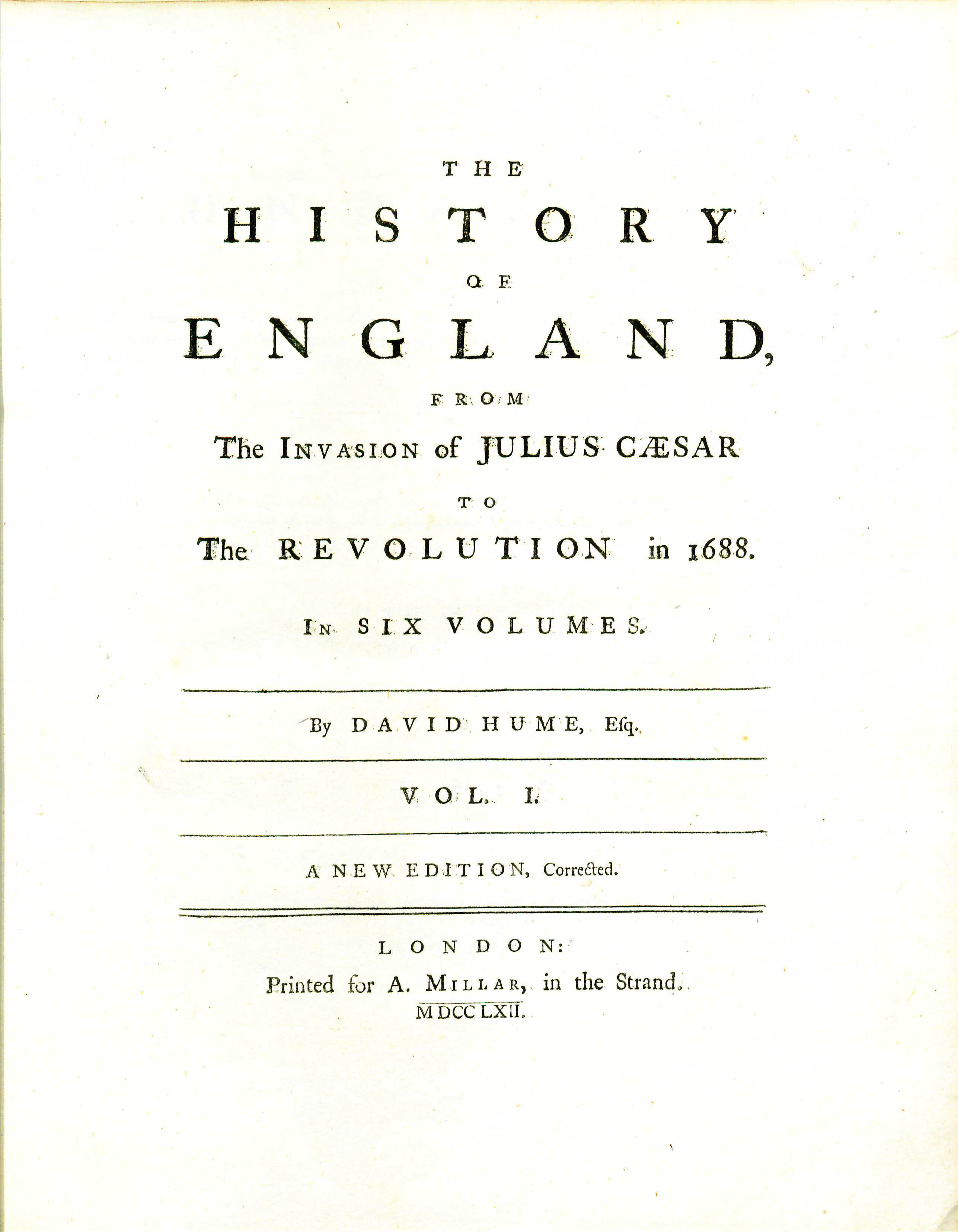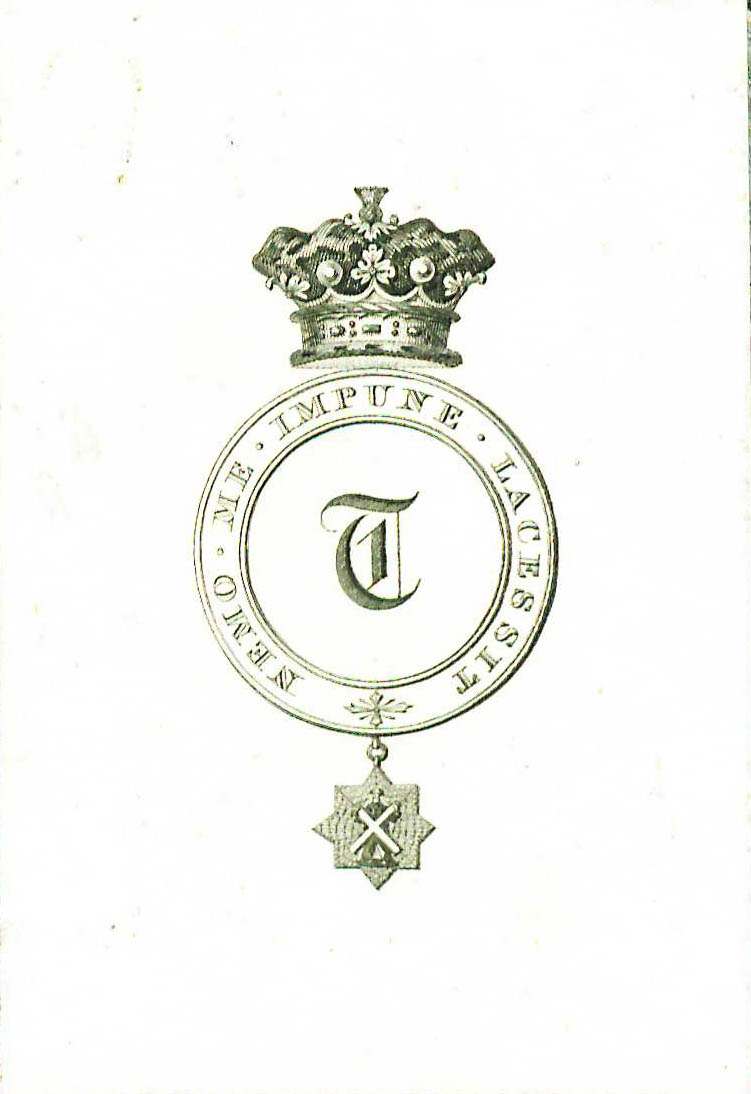Difference between revisions of "History of England, from the Invasion of Julius Caesar to the Revolution of 1688"
m |
(Summary paragraphs by Lindsay Sfekas.) |
||
| Line 2: | Line 2: | ||
===by David Hume=== | ===by David Hume=== | ||
__NOTOC__ | __NOTOC__ | ||
| − | + | {{BookPageTitlePage | |
| + | |imagename=HumeHistoryofEngland1761TitlePageV1.jpg | ||
| + | |link=https://catalog.swem.wm.edu/law/Record/3719557 | ||
| + | |shorttitle=The History of England | ||
| + | |vol=volume one | ||
| + | }} | ||
| + | [http://en.wikipedia.org/wiki/David_Hume David Hume] (1711–1776) is considered the most accomplished philosopher to ever write in the English language. Influencing many of his famous contemporaries, Hume is well known for his work as a historian and essayist. He is considered to be a “precursor of contemporary cognitive science” and a driving force in philosophical naturalism.<ref>William Edward Morris, "David Hume" in ''The Stanford Encyclopedia of Philosophy'' (Stanford University Pres, 2013- ), accessed Oct. 7, 2013 http://plato.stanford.edu/archives/spr2013/entries/hume/.</ref> Born in Edinburgh, Hume attended Edinburgh University at a very young age—leaving in 1725 at the age of 14.<ref>John Robertson, [http://www.oxforddnb.com/view/article/14141 "Hume, David (1711–1776)"] in ''Oxford Dictionary of National Biography'' (Oxford University Press, 2004- ), accessed Oct. 7, 2013]. (Subscription required for access.)</ref> His family intended that Hume would follow his father in law, but this proposition never bore fruit. Instead, Hume devoted himself to philosophical study and writing, producing his first great work, ''A Treatise of Human Nature'', in 1739.<ref>Ibid.</ref><br /> | ||
| + | <br /> | ||
| + | {{BookPageBookplate | ||
| + | |imagename=HumeHistoryofEngland1761BookplateV1.jpg | ||
| + | |display=left | ||
| + | |caption=Bookplate from front paste down, volume one. | ||
| + | }} | ||
| + | Other works followed, including ''The History of England'', which was published in six volumes from 1754 to 1762 and became a best seller. The work spans English history from Caesar’s invasion to the Glorious Revolution of 1688.<ref>''Encyclopædia Britannica Online'', s. v. "History of England," accessed October 07, 2013, http://www.britannica.com/EBchecked/topic/267616/History-of-England.</ref> In this set, Hume attempts to give an unbiased and “impartial account that looks at political institutions as historical developments responsive to Britons' experience of changing conditions, evaluating political decisions in the contexts in which they were made, instead of second-guessing them in the light of subsequent developments.”<ref>Morris, "David Hume".</ref> It was a groundbreaking work because it was “unprecedentedly readable, in structure as well as in phrasing. Persons and events were woven into causal patterns that furnished a narrative with the goals and resting points of recurrent climaxes.”<ref>''Encyclopædia Britannica Online'', s. v. "History of England."</ref> Future history books would be based on the writing and styles of Hume’s ''History of England''. | ||
==Bibliographic Information== | ==Bibliographic Information== | ||
| − | '''Author:''' David Hume | + | '''Author:''' David Hume. |
| − | '''Title:''' The History of England, from the Invasion of Julius Caesar to the Revolution of 1688: in six volumes | + | '''Title:''' ''The History of England, from the Invasion of Julius Caesar to the Revolution of 1688: in six volumes''. |
| − | '''Publication Info:''' London: Printed for A. Millar, | + | '''Publication Info:''' London: Printed for A. Millar, 1762. |
| − | '''Edition:''' | + | '''Edition:''' ; six volumes. |
==Evidence for Inclusion in Wythe's Library== | ==Evidence for Inclusion in Wythe's Library== | ||
| − | |||
==Description of the Wolf Law Library's copy== | ==Description of the Wolf Law Library's copy== | ||
| − | Bound in contemporary calf with stamped decorative borders and gilt filets to covers. Spines feature 5 raised bands, gilt stamps and gilt lettering. Edges are marbled. Each volume includes a bookplate with the initial "T" and the motto "Nemo me impune lacessit" (No one attacks me with impunity.) surmounted by a crown. | + | Bound in contemporary calf with stamped decorative borders and gilt filets to covers. Spines feature 5 raised bands, gilt stamps and gilt lettering. Edges are marbled. Each volume includes a bookplate with the initial "T" and the motto "Nemo me impune lacessit" (No one attacks me with impunity.) surmounted by a crown.<br /> |
| − | + | <br /> | |
View this book in [https://catalog.swem.wm.edu/law/Record/3719557 William & Mary's online catalog.] | View this book in [https://catalog.swem.wm.edu/law/Record/3719557 William & Mary's online catalog.] | ||
===References=== | ===References=== | ||
Revision as of 16:14, 7 October 2013
by David Hume

David Hume (1711–1776) is considered the most accomplished philosopher to ever write in the English language. Influencing many of his famous contemporaries, Hume is well known for his work as a historian and essayist. He is considered to be a “precursor of contemporary cognitive science” and a driving force in philosophical naturalism.[1] Born in Edinburgh, Hume attended Edinburgh University at a very young age—leaving in 1725 at the age of 14.[2] His family intended that Hume would follow his father in law, but this proposition never bore fruit. Instead, Hume devoted himself to philosophical study and writing, producing his first great work, A Treatise of Human Nature, in 1739.[3]
Other works followed, including The History of England, which was published in six volumes from 1754 to 1762 and became a best seller. The work spans English history from Caesar’s invasion to the Glorious Revolution of 1688.[4] In this set, Hume attempts to give an unbiased and “impartial account that looks at political institutions as historical developments responsive to Britons' experience of changing conditions, evaluating political decisions in the contexts in which they were made, instead of second-guessing them in the light of subsequent developments.”[5] It was a groundbreaking work because it was “unprecedentedly readable, in structure as well as in phrasing. Persons and events were woven into causal patterns that furnished a narrative with the goals and resting points of recurrent climaxes.”[6] Future history books would be based on the writing and styles of Hume’s History of England.
Bibliographic Information
Author: David Hume.
Title: The History of England, from the Invasion of Julius Caesar to the Revolution of 1688: in six volumes.
Publication Info: London: Printed for A. Millar, 1762.
Edition: ; six volumes.
Evidence for Inclusion in Wythe's Library
Description of the Wolf Law Library's copy
Bound in contemporary calf with stamped decorative borders and gilt filets to covers. Spines feature 5 raised bands, gilt stamps and gilt lettering. Edges are marbled. Each volume includes a bookplate with the initial "T" and the motto "Nemo me impune lacessit" (No one attacks me with impunity.) surmounted by a crown.
View this book in William & Mary's online catalog.
References
- ↑ William Edward Morris, "David Hume" in The Stanford Encyclopedia of Philosophy (Stanford University Pres, 2013- ), accessed Oct. 7, 2013 http://plato.stanford.edu/archives/spr2013/entries/hume/.
- ↑ John Robertson, "Hume, David (1711–1776)" in Oxford Dictionary of National Biography (Oxford University Press, 2004- ), accessed Oct. 7, 2013]. (Subscription required for access.)
- ↑ Ibid.
- ↑ Encyclopædia Britannica Online, s. v. "History of England," accessed October 07, 2013, http://www.britannica.com/EBchecked/topic/267616/History-of-England.
- ↑ Morris, "David Hume".
- ↑ Encyclopædia Britannica Online, s. v. "History of England."
